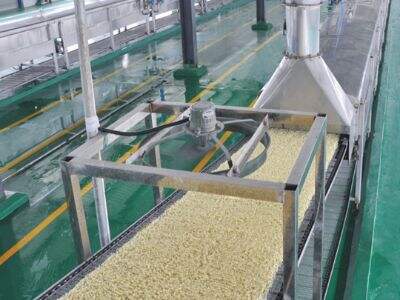Ever wondered how commercial pasta machines ensure their pasta is an even thickness every time? It’s a magic trick — provided you heed science’s advice to ensure that the pasta is always delicious. In this lesson, we’ll look at what makes these machines tick and crack their secrets to the perfect dough.
How Commercial Pasta Makers Work
Professional pasta machines are kitchen superheroes. They help make great pasta that has an equal thickness, which makes them attractive to both cooks and pasta fans. But how do these machines accomplish such miracles?
It’s all in how they are made. Authentic pasta machines feature dedicated components that the devices use to knead, roll, and flatten dough to the right thickness for various types of pasta. The process begins in a dough hopper, where the pasta dough comes in. The dough is then passed through rolling machines that flatten it. And at the end, it is cut for shapes, like spaghetti or fettuccine.
The secret to having the dough the same thickness every time is the rollers. They are machines that come with rollers that are adjustable based on how thick you want them. This helps cooks make sure the dough is thick, not too thick, as this helps to ensure that every batch of pasta is just right.
The Secret to Even Thickness
The key to great pasta is having the dough be the same thickness. Commercial pasta machines have figured out how to do this well. And the less fussy it looks.” Keeping the dough consistent in thickness means that every strand of pasta cooks at roughly the same time, so dinner is delicious.
One way these machines maintain the dough thick and unchanged is by featuring strong materials. The parts on professional pasta makers are designed to put up with daily use in busy kitchens. This is what gives the rollers their strength and ensures the resulting dough is thick and doesn’t slacken.
Another gimmick is the smart technology. Commercial pasta machines are packed with handy features like digital controls and sensors that monitor the dough thickness as it is cut. This helps cooks make adjustments right away to ensure that the dough texture remains perfect each time.
The History of Pasta Machines
Pasta machines have come a long way. Before time-saving kitchen devices, pasta was made by hand in the simplest ways, employing tools like rolling pins and knives. But as demand for pasta grew, cooks needed a faster way to produce it.
It’s this demand that gave rise to pasta machines, these revolutionary devices that transformed the process of making pasta. Early machines were limited and required cooks to turn a handle to flatten the dough. They evolved over time to become more sophisticated, with additional features aimed at making pasta faster and easier to prepare.
These day top-notch pasta makers are constructed with the newest world’s technology to ensure they produce perfect pasta every time. Featuring adjustable rollers and digital controls, the machines support cooks in today’s kitchens who want to prepare great pasta with minimal effort.
How Machines Preserve Dough Thickness for Most Excellent Pasta
Professional pasta machines are a great aid in the kitchen, to ensure that it is perfect all the time. They do one crucial thing: maintain the thickness of the dough as it goes in and out in the pasta-making process.
Keeping the dough the same thickness is key to pasta that cooks nicely and tastes good. Commercial pasta machines are especially good at this, as they have parts specifically fashioned to roll the dough to its optimum thickness (diameter) for each pasta type.
And to ensure the dough is thick enough, the machines apply pressure with just the right amount of accuracy. The rollers exert the perfect amount of pressure on the dough to flatten it, and sensors ensure that the dough is rolled evenly. And this meticulous work ensures that every batch of pasta is crafted thoughtfully.
How Machines Make Even Thickness Dough
Consistency is the key to preparing good pasta and professional pasta machines excel at it. By maintaining consistent dough thickness, these machines ensure that all of the pasta is perfectly cooked, with no pieces overcooked or undercooked.
These contraptions attain uniform thickness through a combination of clever technology and good design. Professional pasta machines are well made and cleverly designed, so they produce good results every time.
One way to ensure even spaghetti machine maker thicknesses is with changeable rollers. Cooks can also adjust these rollers to varying levels of thickness, depending upon how thick they want the dough to be. That way, every batch of pasta is a perfect match to your chosen recipe.
And that is how professional pasta machines end up being the unsung heroes of the kitchen, ensuring that each of your pasta batches is of uniform thickness. And by understanding how these machines operate and their secrets, cooks can produce delicious pasta that everyone loves. With machines designed for professional use leading the way, the future of pasta-making looks not only bright but delicious.

 EN
EN
 AR
AR
 CS
CS
 DA
DA
 NL
NL
 FI
FI
 FR
FR
 DE
DE
 EL
EL
 IT
IT
 JA
JA
 KO
KO
 NO
NO
 PL
PL
 PT
PT
 RO
RO
 RU
RU
 ES
ES
 SV
SV
 TL
TL
 ID
ID
 LT
LT
 SR
SR
 SK
SK
 UK
UK
 VI
VI
 HU
HU
 TH
TH
 TR
TR
 AF
AF
 AZ
AZ
 BN
BN
 LO
LO
 LA
LA
 MN
MN
 NE
NE
 MY
MY
 KK
KK
 UZ
UZ


